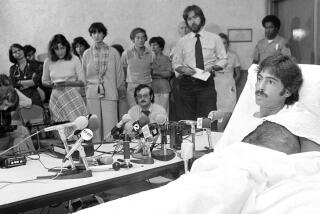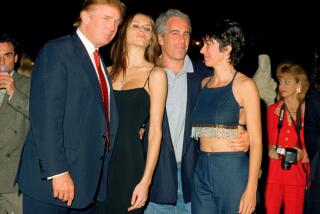S & L Official Pleads Against Lenient Dierdorff Sentence
- Share via
It is not unusual for a once-respected citizen convicted of a white-collar crime to submit letters of reference to his judge in an effort to avoid being sent to prison.
So the letters pleading for leniency for Daniel W. Dierdorff, one-time president of high-flying Sun Savings & Loan Assn., were impressive but not unprecedented.
What was unprecedented was a letter from a top executive of the second-largest savings and loan in San Diego County saying that a prison sentence for Dierdorff would finally show other financial wizards that they cannot “lie, cheat and steal” or expect leniency just because they have indulged themselves in charitable activities.
Wants Time Served
Invoking the names J. David Dominelli and C. Arnolt Smith as other financial criminals who simultaneously engaged in public charity and private theft, the executive wrote:
“Please do our community and my industry a service. Allow this felon to serve substantial time in a suitable prison.”
The letter was one among more than 60 sent to Federal Judge John S. Rhoades, who is weighing the U. S. attorney’s request that Dierdorff be sentenced to 10 years in prison on two felony counts of fraudulent misuse of the thrift’s money. Most were from persons who responded to requests from Dierdorff and his defense attorney to write letters in his favor.
Letters were received from San Diego City Manager John Lockwood, State Sen. Larry Stirling, retired Superior Court Judge Jack Levitt, retired Chargers football star Kellen Winslow, Chargers executive Jack Teele, former San Diego Councilman Gil Johnson, beer distributor-bank director-sports booster Leon Parma and former FBI agent Kenneth Jensen.
There were also letters from a variety of lesser-known lawyers, businessmen, sports coaches and others who know Dierdorff from college, law school, the Marine Corps or the Stadium Authority.
Details Often Unknown
Many of the letter writers noted that they did not know the details of Dierdorff’s finagling at Sun Savings, which was declared insolvent in 1986 with more than $100 million in loan losses. Others said it wasn’t Dierdorff’s fault.
Some asked directly that Judge Rhoades show leniency and spare Dierdorff from prison. Some, like Levitt and Stirling, did not, sticking instead to warm descriptions of Dierdorff’s sunny, can-do personality and his history of public service, particularly on behalf of wrestling and as a fund-raiser for the Boy Scouts and YMCA.
Stirling, a conservative Republican known as a strong law-and-order advocate, noted that Dierdorff, at the request of then-Mayor Pete Wilson, negotiated with then-Chargers owner Gene Klein to establish the “one car, one space” rule for the parking lot at San Diego Jack Murphy Stadium, credited with avoiding innumerable clashes between late arrivals and space-hogging tailgaters.
Levitt, criticized by defense attorneys during his 16-years on the bench as biased against criminal defendants, said he only knows Dierdorff socially, not professionally.
“I have at all times found him to be congenial, ready to assist others whenever need was expressed and one who gave great value to human kindness. At no time did I ever observe any indication of character weakness.”
Public Service Option
Lockwood, in a letter on city letterhead, went further. He asked that Dierdorff be sentenced to public service rather than prison.
He said he met Dierdorff in the early 1970s when Lockwood’s sons were high school wrestlers and Dierdorff was “the area’s most capable wrestling referee.” He said he later worked with Dierdorff when San Diego was host to the 1979 World Wrestling Championships.
“I believe that Dan still has much to offer this community in the way of public service . . . ,” Lockwood wrote. “In your opinion, if public service is an option, and I can be of any assistance to the court in developing a worthwhile public service program, I am willing to assist as you might dictate.”
He provided his phone number at City Hall and suggested the judge call him.
Prosecutors made no effort to solicit letters asking that Dierdorff be sent to prison. Two such letters have arrived, however.
One is unsigned and typed on yellow paper. It suggests that the judge give Dierdorff a “strict and appropriate” sentence. Such letters are not uncommon in such cases and, given the lack of signature or reasoned argument, are not likely to carry much weight.
The second letter is different. It was received by the federal clerk on Friday from Rod Tompkins, chief administrative officer and senior executive vice president at Great American First Savings Bank in San Diego.
Another Story
He said he wrote his letter as an individual, not as an executive of Great American First. There was no letterhead. He provided his reasons why a prison sentence is appropriate and urged the judge not to be swayed by letters on behalf of Dierdorff.
“As part of my responsibility at Great American, I have managed under the federal regulators’ management consignment program three savings and loans similar to Sun Savings,” Tompkins wrote.
“The facts at Sun Savings sound so familiar that I feel I could finish reciting the script after having only read a couple of pages. Through the span of the 2 1/2 years I have devoted to these three savings and loans, one in Beverly Hills and two in Orange County, I have continually asked myself--why aren’t these people in jail?
“Why are we prepared to throw the full force of the law against a teller who steals $1,800 from his or her cash drawer and then allow executive officers who lie, cheat and steal to receive leniency from the court?
“It has occurred to me more than once that executives do lie, cheat and steal because leniency is their unconscious worst-case expectation. You can help change that.”
The Last Refuge
Testimonials are often the last refuge of the swindler, Tompkins suggested, particularly in boosterish San Diego.
“As to the civic warmheartedness attested to by the various supporters of Mr. Dierdorff, I reflect that this is a familiar trademark. Those who misuse their corporate assets often seek self-aggrandizement by being loved by charitable donation seekers and held in reverence by the young folk to whom they lecture on how to lead productive lives.
“The local names J. David Dominelli and C. Arnolt Smith come to mind. And--supernatural luck at baccarat notwithstanding--one tends to question the source of such largess to begin with.”
(Dierdorff has argued that some of his unexplained money came from his skill at the gaming tables in Las Vegas.)
Don’t be misled that the letters on behalf of Dierdorff reflect the public at large, Tompkins counsels.
“I do not think I delude myself when I say with some conviction that a stiff prison sentence for Mr. Dierdorff would be soundly applauded by the vast majority of the citizens in our community who hold to traditional values about false testimony, theft, falsification of records, forgery and so on, and who find no particular redemption in either Mr. Dierdorff’s civic generosity or elevated status.”
‘Difficult to Write’
Contacted at his office, Tompkins, 45, a 17-year employee of Great American First, said the letter was “very difficult to write.” He is one of six top executives at Great American First, the eighth-largest savings and loan in the nation, with assets of $15.8 billion.
Tompkins said the decision to ask Rhoades to imprison Dierdorff, with whom he worked years ago at Great American, was a painful one, knowing the brutality of prison and the effect on a prisoner’s family.
But he said the balance was tipped by a sense of equity and a belief that the American financial industry will never be cleaned unless top officials are held accountable for misdeeds. If officials had been held accountable, the federal government might have avoided the recent billion-dollar bailouts to savings-and-loan institutions drained by questionable deals and inside manipulations, he said.
“My observation is that, with these failing savings and loans, very few people responsible for the failures ever see the light of justice,” Tompkins said. The courts have to learn to see through the smoke screen of testimonials, he added.
“There are people who do good deeds and people who do bad deeds, and some people do both,” Tompkins said. “The law has to deal with the bad deeds.”
Tompkins said he expects to receive a cold-shoulder from many of his colleagues in the financial industry. One of his former colleagues at Great American, a retired senior vice president, wrote one of the letters asking for leniency.
“I’m sure there will be some problems,” Tompkins said. “I’ll tell people just to read the letter.”
Sentencing Next Month
Sentencing is set for Feb. 13. On Monday, a hearing will be held to discuss the rules of the sentencing hearing.
Assistant U. S. Atty. Yesmin E. Saide wants Judge Rhoades to consider not just the two guilty pleas but also accusations of bribery and kickbacks and other dishonesty contained in the lengthy federal investigation.
Defense attorney Peter Hughes says this is unfair because it seeks to punish Dierdorff for accusations that he “hasn’t been able to confront” in court. Saide counters that without such information, the judge will not be able to appreciate how Dierdorff’s criminality led Sun Savings to ruin.
Dierdorff, 52, a San Diego State University graduate and one-time wrestling star, rose to be chairman and president of Sun Savings, which, at its height, had branches in La Jolla, University City, Rancho Santa Fe and Mission Viejo in Orange County. At one point, it was rated the second highest-performing thrift for its size in the state.
By 1984, however, Sun and Dierdorff’s actions, including dealings with a Las Vegas lawyer reputed to have ties to organized crime, were under investigation by federal prosecutors and regulators.
In mid-1985 a private investigation done for Sun’s directors accused Dierdorff of a series of inside deals, including a secret account, receiving gifts, charging personal expenses and approving questionable commissions.
A year later Sun was declared insolvent, and the federal government reimbursed depositors. In June, Dierdorff pleaded guilty to keeping a secret $200,000 account and forging a $2,000 check.
More to Read
Sign up for Essential California
The most important California stories and recommendations in your inbox every morning.
You may occasionally receive promotional content from the Los Angeles Times.










